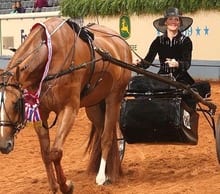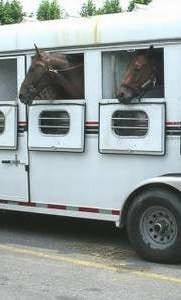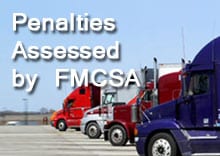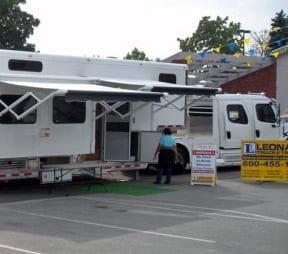UPDATE: GoHorseShow.com received information that may be helpful regarding having to get a CDL license to haul your horse trailer. Bob Redmond at the Federal Motorcarrier Safety Administration in Washington DC said that as far as a National rule goes–as long as you are not in commerce you do not need a CDL license.
Redmond did say, however, that most officers (police) are not very well educated on the law. Some law enforcement officers just go by the rule that anyone hauling a trailer with a GVW of 26000 pounds or greater must have a CDL.
We asked how non professionals can explain to an officer if they are stopped that they are not required to have a CDL and he said it’s difficult, however, if they were to get ticketed, they would probably be able to fight it and win–as it is not a business. That of course is no consolation if the officer does not let you continue on your way.
If you have anymore questions, you can contact the Federal Motorcarrier Safety Administration at 1-800-832-5660 for more information
—————————————
ATTENTION ALL HORSE TRAINERS AND INDIVIDUALS MAKING A LIVING IN THE HORSE BUSINESS. You need to read this article–there may be some unforeseen
costs coming your way. Due to an increase in horse trailer accidents in
the past five years, the Department of Transportation (DOT) has decided
to start enforcing rules regarding trucks and trailers of a certain
weight. Check out the article to see if you may need to get your Commercial Driver’s License (CDL).
Many horse trainers, and other people who make a living in this industry have been skirting the laws for years regarding their requirements of needing a Commercial Driver’s License (CDL). GoHorseShow.recently talked to Lainie DeBoer about her recent “nightmare” of having to apply and test for a Commercial Driver’s License (CDL).
According to the Department of Transportation, any truck over 10,000 pounds (a dually) must have a DOT number and comply with DOT restrictions. If you have a truck and trailer with a GVW (gross vehicle weight) combined 26,000 lbs. (a four horse or more) you must have a CDL (commercial drivers license). If you are under 26,000 GVW you still must comply with the DOT such as inspections, log books, driver physicals, and insurance.
According to the horse trailer regulations provided by the Minnesota Department of Public Safety, Gross Vehicle Weight (GVW) means the GREATER of:
• The actual weight (weight of the truck plus the load it’s carrying)
OR
• Gross Vehicle Weight Rating GVWR, which is set by the manufacturer
GoHorseShow.com talked to Minnesota State Patrolman Travis Schapp about the CDL requirements for horse trailers.
“These rules have been in effect for years, but we are trying to now catch up the smaller vehicles and trucks and trailers with the dump trucks and the semi-trucks,” Schapp said. “It is soley based on the weight of the vehicle whether you need a CDL. If you make your living my hauling horses or in the horse industry and are over the maximum weight–you need a CDL.”
According to Lainie DeBoer, “If you are driving a truck and trailer, and you are receiving money for it, you have sponsors, you are earning money at the show through training or money won you are considered commercial. There is no such thing as ‘not for hire.’ The man at the DOT said that is the biggest red flag, and they pull those people over first.”
 What does it mean to have a DOT number? DeBoer says, “You must have all your vehicles inspected each year as well as trailers. Each driver must have a physical every two years and a file kept of their information. You must have a minimum of $750,000 worth of insurance,” she said. “You have to have a CDL if you are over 26,000 lbs GVW. You can only drive 11 hours per driver. You must keep a log book. You must make inspections of your vehicle before and after a trip and keep them on file. You must go through weigh stations. You can also be randomly tested for drugs and alcohol.”
What does it mean to have a DOT number? DeBoer says, “You must have all your vehicles inspected each year as well as trailers. Each driver must have a physical every two years and a file kept of their information. You must have a minimum of $750,000 worth of insurance,” she said. “You have to have a CDL if you are over 26,000 lbs GVW. You can only drive 11 hours per driver. You must keep a log book. You must make inspections of your vehicle before and after a trip and keep them on file. You must go through weigh stations. You can also be randomly tested for drugs and alcohol.”
If a driver of a truck and trailer gets pulled over and they do not have a CDL, and they are over 26,000 lbs GVW, they will not be allowed to go any further until a CDL driver can drive their rig. They could also face up to a $5,000 fine. In this past year alone, they are pulling over people actively. There is a big push by the DOT to bring safety back to the roads. According to DeBoer, even farriers are getting pulled over.
“I am really worried for our industry. Things are expensive enough with rising gas prices and now this,” Lainie told GoHorseShow.com. “I don’t have my CDL yet, so I have had to hire drivers. That means paying a driver and flying them back and forth to a show. My insurance has skyrocketed. I have to rethink what horse shows I can go to without incurring too much costs.”
 Trainer and AQHA judge Stephanie Lynn tells GoHorseShow about one incident where she was pulled over. She was taking a horse to a veterinarian in Minnesota. After crossing the Wisconsin border into Minnesota, she was pulled over into the weigh station. Her fuel was tested, her vehicle was weighed, and she was ordered to have someone with a CDL come and drive her rig. “Of course, I refused, but the most they would allow is an escort back across the state line. I was not able to get my horses to the vet, because I did not know anyone with a CDL.”
Trainer and AQHA judge Stephanie Lynn tells GoHorseShow about one incident where she was pulled over. She was taking a horse to a veterinarian in Minnesota. After crossing the Wisconsin border into Minnesota, she was pulled over into the weigh station. Her fuel was tested, her vehicle was weighed, and she was ordered to have someone with a CDL come and drive her rig. “Of course, I refused, but the most they would allow is an escort back across the state line. I was not able to get my horses to the vet, because I did not know anyone with a CDL.”
Lynn adds, “I think that we have been skirting the laws for years in all states. Technically, we should all have CDL’s. I definitely think it is a financial burden – in any economy. We are so close to agriculture without really being considered agricultural. Horse trainers cannot afford the costs that go with CDL’s. It will infinitely change the climate of our horse shows.”
As reported on the EquiSpirit (www.equispirit.com) website that is dedicated to horse trailers and safety information. These are the regulations they have posted.
 How do these regulations and terms apply to horse trailers?
How do these regulations and terms apply to horse trailers?
“Commerce” can be more loosely defined as actually “involved in a commercial venture” or the “intent” to make a profit. This does not mean actually making a profit! Running a commercial stable, hauling horses for show (with intent to profit), race, sale, training, or for compensation are some examples of commercial enterprises. Prize money and showing to increase the value of the horse can be interpreted as profit.
1. If you are driving a vehicle or combinations of vehicles under 10,001 lbs. GVW (Gross Vehicle Weight–weight of the truck plus the load it is carrying) or GVWR (Gross Vehicle Weight Rating–which is set by the manufacturer), you don’t have to be concerned with the FMCSR’s (Federal Motor Carrier Safety Regulations–that is set by the manufacturer) or a commercial driver’s license (CDL). You must, however, follow the safety equipment requirements and driver’s license requirements of your own state.
2. If you are driving a vehicle or combination of vehicles on the interstate that is 10,001 to 26,000 pounds GVWR, you must decide if you are commercial and subject to FMCSR. You do not need a commercial driver’s license (CDL), although your home state may have an additional classification of driver’s license. (The initial decision is up to the owner whether or not he/she is pursuing a hobby or is involved in interstate commerce and he/she bears the burden of proof. If you only travel within your state, you may follow the state definitions of commercial, but if you plan to travel into other states and your vehicle or combination is 10,001 lbs or more, the official recommendation from Federal Authorities is that you follow FMCSR’s)
3. If you are driving a vehicle or combination of vehicles intrastate 10,001 to 26,000 lbs GVWR, you must follow your home state requirements if they differ from the Federal requirements.
4. If you are driving a vehicle or combinations of vehicles 26,001 lbs. GVWR or more interstate you must have a commercial driver’s license (CDL) and you must follow FMCSR.
5. If you are driving a vehicle or combination of vehicles 26,001 lbs. GVWR or more intrastate, you must follow your state guidelines for commercial licensing (CDL), and FMCSR requirements.
 Farm exemptions can be obtained in some instances, but the vehicle must stay within 150 miles of home.
Farm exemptions can be obtained in some instances, but the vehicle must stay within 150 miles of home.
Many states require trucks and trailers to have license plates that are labeled “commercial” but this does not always mean you are considered “commercial” in all states. Please check with your local DOT to find out the rules in your area.
So, what do GoHorseShow.com readers think about this new crackdown on horse trailers? Do you agree due to safety reasons? Or do you think it will put a financial burden on an already struggling horse economy?
Let us know your thoughts by commenting below.
**While we have tried to include the most accurate information, the DOT rules pertaining to horse trailers appear to be a very “gray area”–we highly recommend you talking to your local DOT office for more information and advice regarding the specific trailer you are hauling to shows and whether they consider you a commercial vehicle that requires a CDL.









